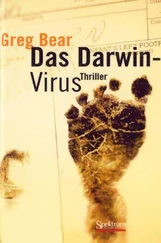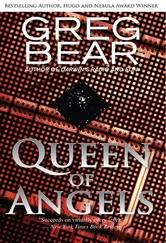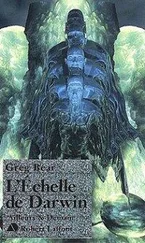Christopher Dicken was legendary even at Fort Detrick. He had tracked Mrs. Rhine to a motel in Bend, Oregon, where she had fled after the death of her husband and daughter. He had talked her into opening the door to the small, spare room, and had spent twenty minutes with her, unprotected, while Emergency Action vans gathered in the parking lot.
He had done all this, despite having already contracted Shiver from a woman in Mexico the year before. That woman, a plump female in her forties, seven months pregnant, had been severely beaten by her husband. A small, stupid, jackal-like man with a long criminal record, he had kept her alone and without medical help in a small room at the back of a shabby apartment for three months. Her baby had been born dead.
Something in the woman had produced a defensive viral response, enhanced by SHEVA, and her husband had suffered the consequences. In his darkest early morning vigils of pacing, tending phantom twitches and pains in his leg, alone and wide awake, Dicken had often thought of the husband’s death as natural justice, and his own exposure and subsequent illness as accidental blow-by—an occupational hazard.
Mrs. Rhine’s case was different. Her problems had been caused by an interplay of human and natural forces no one could have possibly predicted.
In the late nineties, she had suffered from end-stage renal disease and had been the recipient of an experimental xenotransplant—a pig kidney. The transplant had worked. Three years later, Mrs. Rhine had contracted SHEVA from her husband. This had stimulated an enthusiastic release of PERV—Porcine Endogenous Retrovirus—from the pig cells. Before Mrs. Rhine had been diagnosed and isolated at Fort Detrick, her pig and human retroviruses had shuffled genes—recombined—with latent herpes simplex virus and had begun to express, with diabolical creativity, a Pandora’s box of long-dormant diseases, and many new ones.
Ancient viral tool kits, Mark Augustine had called them, with true prescience.
Mrs. Rhine’s husband, newborn daughter, and seven relatives and friends had been infected by the first of her recombined viruses. They had all died within hours.
Of forty-one individuals who had received pig tissue transplants in the United States, and had subsequently been exposed to SHEVA, the women at the center were the only survivors. Perversely, they were immune to the viruses they produced. Isolated as they were, the four women never caught colds or flu. That made them extraordinary subjects for research—deadly but invaluable.
Mrs. Rhine was a virus hunter’s dream, and whenever Dicken did dream about her, he awoke in a cold sweat.
He had never told anyone that his approach to Mrs. Rhine in that motel room in Bend had had less to do with courage than with a reckless indifference. Back then, he simply had not cared whether he lived or died. His entire world had been turned upside down, and everything he thought he knew had been subjected to a harsh and unmerciful glare.
Mrs. Rhine was special to him because they had both been through hell.
“Suit up,” Freedman said. They took off their clothes in separate stalls and hung them in lockers. Small video screens mounted beside the multiple shower heads in each stall reminded them where and how to scrub.
Freedman helped Dicken pull his undergarment over his stiff leg. Together, they tugged on thick plastic gloves, then slipped their hands into the mitts of the pickle-green suits. This left them with all the manual dexterity of fur seals. Fingerless suits were tougher, more secure, and cheaper, and nobody expected visitors to the inner station to do delicate lab work. Small plastic hooks on the thumb side of each glove allowed them to pull up the other’s rear zipper, then strip away a plastic cover on the inner side of a sticky seam. A special pinching tool pressed the seam over the zipper.
This took twenty minutes.
They walked through a second set of showers, then through another airlock. Confined within the almost airless hood, Dicken felt perspiration bead his face and slide down his underarms. Beyond the second airlock, each hooked the other to their umbilicals—the familiar plastic hoses suspended on clanking steel hooks from an overhead track.
Their suits plumped with pressure. The flow of fresh cool air revived him.
The last time, at the end of his visit, Dicken had emerged from his suit with a nosebleed. Freedman had saved him from weeks of quarantine by diagnosing and stanching the bleeding herself.
“You’re good for the inner,” the orderly told them through a bulkhead speaker.
The last hatch slid open with a silky whisper. Dicken walked ahead of Freedman into the inner station. In sync, they turned to the right and waited for the steel window blinds to ratchet up.
The few incidents of Shiver had started at least a hundred crash courses in medical and weapons-related research. If abused women, and women given xenotransplants, could all by themselves design and express thousands of killer plagues, what could a generation of virus children do?
Dicken clenched his jaw, wondering how much Carla Rhine had changed in sixth months.
Something of a saint, poor dear.
Office of Special Reconnaissance
LEESBURG, VIRGINIA
Mark Augustine walked with a cane down a long underground tunnel, following a muscular red-headed woman in her late thirties. Big steam pipes lined the tunnel on both sides and the air in the tunnel was warm. Conduits of fiber optic cables and wires were bundled and cradled in long steel trays slung from the concrete ceiling, and away from the pipes.
The woman wore a dark green silk suit with a red scarf and running shoes, gray with outdoor use. Augustine’s hard-soled Oxfords scuffed and tapped as he trailed several steps behind, sweating. The woman showed no consideration for his slower pace.
“Why am I here, Rachel?” he asked. “I’m tired. I’ve been traveling. There’s work to do.”
“Something’s developing, Mark. I’m sure you’ll love it,” Browning called back over her shoulder. “We’ve finally located a long-lost colleague.”
“Who?”
“Kaye Lang,” Browning replied.
Augustine grimaced. He sometimes pictured himself as a toothless old tiger in a government filled with vipers. He was perilously close to becoming a figurehead, or worse, a clown over a drop tank. His only remaining survival tactic was a passive appearance of being outpaced by young and vicious career bureaucrats attracted to Washington by the smell of incipient tyranny.
The cane helped. He had broken his leg in a fall in the shower last year. If they thought he was weak and stupid, that gave him an advantage.
The maximum depth of Washington’s soulless vacancy was the proud personal record of Rachel Browning. A specialist in law enforcement data management, married to a telecom executive in Connecticut whom she rarely saw, Browning had begun as Augustine’s assistant in EMAC—Emergency Action—seven years ago, had moved into foreign corporate interdiction at the National Security Agency and had finally jumped aisle again to head the intelligence and enforcement branch of EMAC. She had started the Special Reconnaissance Office—SRO—which specialized in tracking dissidents and subversives and infiltrating radical parent groups. SRO shared its satellites and other equipment with the National Reconnaissance Office.
Once upon a time, in a different lifetime, Browning had been very useful to him.
“Kaye Lang Rafelson is not someone you just lure and bust,” Augustine said. “Her daughter is not just another notch on the handle of our butterfly net. We have to be very careful with all of them.”
Читать дальше
Конец ознакомительного отрывка
Купить книгу












